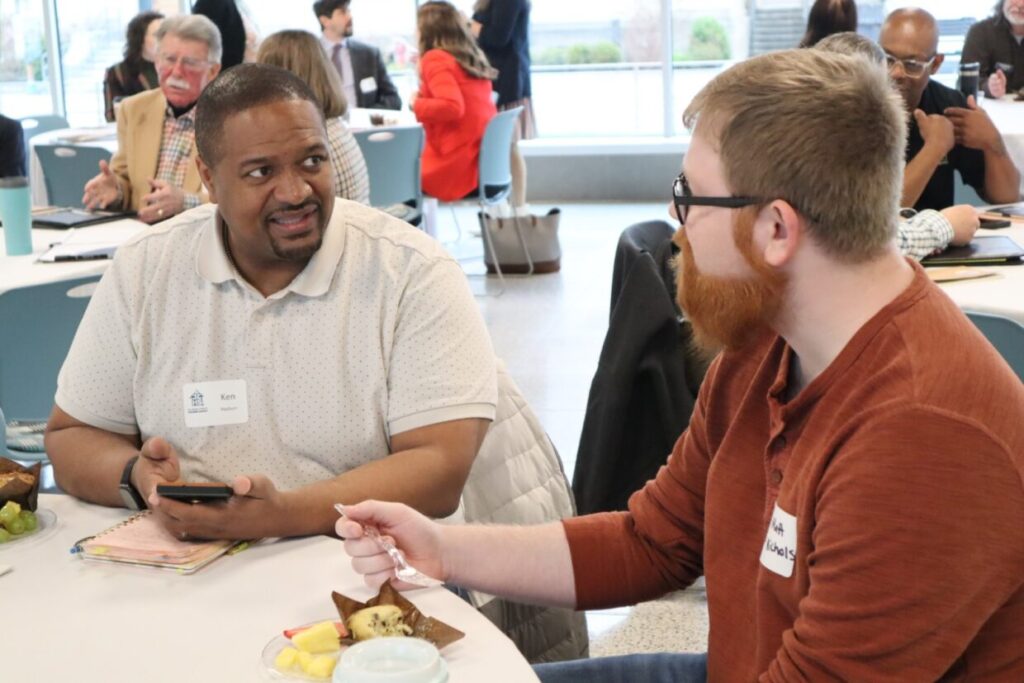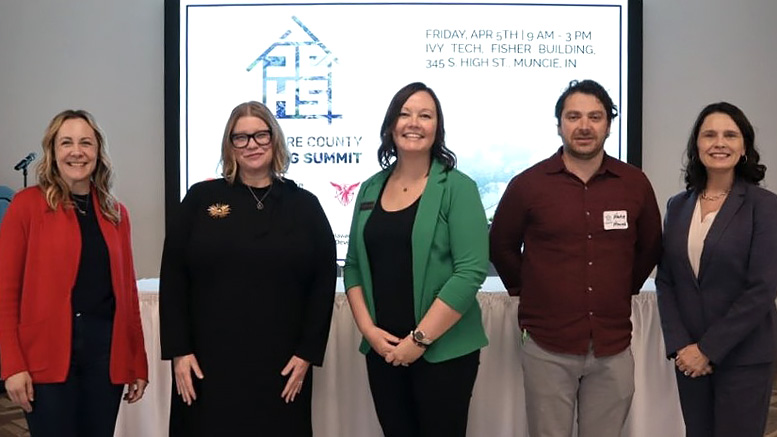By Michelle Kinsey—
MUNCIE, IN – It was a full house at the first ever Delaware County Housing Summit on Friday, April 5, at the Ivy Tech Fisher Building in downtown Muncie.
More than 100 people attended the event to learn more about the county’s current housing situation and best practices for housing development.
“I was excited to see so many different faces from across our community – developers, landlords, elected officials, and neighbors,” said Heather Williams, Associate Director in the Office of Community Engagement at Ball State University and Program Manager for Building Better Neighborhoods. “I count this as a success!”
The Housing Summit was presented by Muncie-Delaware County Economic Development Alliance, the Greater Muncie Chamber of Commerce, Ball State University’s Office of Community Engagement, and Muncie Land Bank. Breakfast and lunch for participants was provided by the Muncie Sanitary District, and Ivy Tech Community College served as the host sponsor.
The seeds for the summit were planted during the development of the 5-year Vision 2027 Economic Development Plan, created by the Muncie Delaware County Economic Development Alliance. The summit was cited as one of the ways to advance progress toward the local revitalization and enrichment goal.
“As representatives of the local business community, we recognize that quality housing options, affordability, and availability are integral components of Muncie-Delaware County’s economic competitiveness and growth potential,” said Elizabeth Rowray, President & CEO, Greater Muncie Chamber of Commerce and Muncie-Delaware County Economic Development Alliance.

More than 100 people attended the Housing Summit, which featured keynote speakers, panel discussions and more. Photo provided
The summit, Rowray said, was designed to “start the conversation” and then, as Vision 2027 notes, put an action plan in place.
The conversation started with background information on housing, provided by morning keynote speaker Dagney Faulk, director of research at the Center for Business and Economic Research (CBER) at Ball State University.
Faulk shared data that impacts housing – housing stock (“there is an excess supply of older housing stock in the county”); where people work (9,000 workers commute into Delaware County each day and 7,300 commute out of the county each day), population (a decrease of 5,000 since 2011); and much more.
Armed with all that information, it was time for participants to head to breakout sessions. Experts were brought in from around the county and state to focus on various housing topics applicable to Delaware County.
During a best practices session, representatives from Pathstone Indiana, EcoRehab, Urban Light Community Church, Intend Indiana, and Muncie Mission Ministries fielded questions about how non-profits play an important role in transforming communities. Another session spotlighted Cook Medical and its workforce housing initiative.
A panel to discuss local codes and state legislation as it relates to successful housing development featured Mark Shublak, a partner in Taft’s Public Affairs Strategies Group; Jim Pressel, Indiana State Representative, and Rick Wajda, CEO for the Indiana Builders Association, a trade association representing more than 2,600 member companies across the state.
A developer panel that discussed the “real costs” of housing included Rebekah Hanna, a realtor at RE/MAX in Muncie for 18 years; Scott Alexander, State Senator, and Ryan Kelley: Vice President of Tax Credit Development for TWG.
Keynote speakers included Nassif Kouton from the Indiana Economic Development Corporation, who offered an update READI 2.0 funding, and Heather Presley Cowen, who shared what she’s learned during her more than 25 years of housing and economic development-related experience.
Presley Cowen worked for two decades with Fort Wayne as its senior executive responsible for directing, developing, and planning the overall housing and neighborhood development strategies, and is credited with inventing the Housing Optimization Market Empowerment (H.O.M.E.) Method, a proprietary housing delivery system designed to expedite and optimize workforce housing solutions.
Her analogy to better explain a common housing issue was a favorite of the day. “If you go to the grocery store to get ketchup, and that’s all they have, it would be fine for a while. But what happens when you want some hot sauce? Or chili sauce?
If you want something and it’s not there, you leave and go somewhere else,” Cowan said. She championed the benefits of looking at the potential of an area, not just more of the same.
“The data and insights shared at the Summit underscore the vital need for a comprehensive housing study and plan. A clear understanding of our current housing landscape is essential to develop informed policies and strategic investments that will benefit our community for years to come,” added Rowray.
As participants left the summit, it was clear that many saw more than the current housing issues in Delaware County. They were excited about the hot sauce in the future.



